This week lawmakers returned to Capitol Hill following an extended recess period. With a critical funding deadline landing this week, Congress announced a new short-term extension of existing federal funding to provide more time for ongoing negotiations to continue. Elsewhere, Senate Minority Leader Mitch McConnell has announced that he is stepping down while new apprenticeship grants have been announced by federal agencies.
Lawmakers Announce New Short-Term Funding Agreement
 Two critical funding deadlines for federal fiscal year 2024 (FY24) have swiftly approached: today, March 1, and next week on March 8, when existing FY24 funding is set to expire. As Advance CTE has been sharing for the last several weeks, Congressional leaders have been struggling to find consensus on full-year FY24 appropriations legislation, including the measure that provides funding for the Carl D. Perkins Career and Technical Education Act (Perkins V).
Two critical funding deadlines for federal fiscal year 2024 (FY24) have swiftly approached: today, March 1, and next week on March 8, when existing FY24 funding is set to expire. As Advance CTE has been sharing for the last several weeks, Congressional leaders have been struggling to find consensus on full-year FY24 appropriations legislation, including the measure that provides funding for the Carl D. Perkins Career and Technical Education Act (Perkins V).
With time running short, Congressional leaders have been meeting throughout the week to chart a path forward. Late Wednesday evening, Congressional leaders announced a new bipartisan FY24 funding agreement extending these deadlines, at current FY23 funding levels, through March 8 and 22. The new continuing resolution (CR) agreement splits the dozen annual funding measures that compose the federal budget into two tranches. These two tranches now equally divide these measures with half now expiring next Friday, March 8, and the remainder on March 22. Of note for the Career Techincal Education (CTE) community, the House Subcommittee on Labor, Health and Human Services, Education and Related Agencies (Labor-HHS-ED) funding measure, which provides funding for the U.S. Departments of Education (ED) and Labor (DOL) along with programs these agencies administer, lands on the latter of these dates.
This agreement is intended to provide lawmakers with additional time to resolve outstanding issues related to full-year FY24 funding. These issues reportedly continue to center on the inclusion of additional and controversial policies, known as “policy riders,” which some Republican lawmakers are seeking to attach to FY24 funding measures while Democrats have remained opposed. Yesterday, the House passed this additional short-term CR by a 320-99 margin. The Senate quickly took up this latest CR and passed it by a wide, bipartisan basis 77-13. The measure now heads to President Biden’s desk where it will be signed into law prior to the existing March 1 funding deadline. Advance CTE is continuing to advocate for a robust investment in CTE via Perkins V’s basic state grant program as part of this wider process and looks forward to its timely completion soon.
Senate Minority Leader McConnell Announces Retirement
Senate Minority Leader Mitch McConnell (R-KY) announced earlier this week that he plans to step down from his leadership role later this year and retire at the end of his current Senate term (lasting through 2026). McConnell has led the Senate Republican Conference since 2007. Multiple senators, including John Thune (R-SD), John Cornyn (R-TX), and John Barrasso (R-WY) are widely expected to vie to succeed McConnell later this year. A formal election for the next Senate Republican leader is expected to take place sometime after the upcoming November elections.
DOL Announces $200M in New Apprenticeship Funding
Earlier this week, the U.S. Department of Labor (DOL) announced the availability of nearly $200 million in new discretionary funding to expand registered apprenticeship programs (RAPs). This latest round of apprenticeship funding includes roughly $100 million in funding for State Apprenticeship Expansion grant funding and $95 million for a second phase of its Apprenticeship Building America, Round 2 (ABA2) grant initiative. Of note for the CTE community, the ABA2 grants include a new priority for applications that emphasize RAP alignment with education systems.
The funding announcement goes on to indicate that additional priority will be given to applications that include CTE and those that also promote postsecondary credit attainment that can articulate for a degree. These funding opportunities are intended to align with DOL’s wider efforts to update apprenticeship regulations, including broadening training opportunities into more non-traditional economic sectors and for underrepresented populations while emphasizing greater intentional alignment with education systems, including CTE. More information on the grant announcements can be found here and here.
HELP Committee Renominates Julie Su
Earlier this week the Senate Health, Education, Labor, and Pensions (HELP) Committee reconsidered Julie Su’s nomination to be the next U.S. Secretary of Labor. As a reminder, Su has been serving in an acting capacity as the head of DOL since her nomination stalled in the Senate last year following opposition from Senator Joe Manchin (D-WV) and all Senate Republicans.  The committee advanced Su’s nomination on a party line vote, 11-10, but it remains unclear if she will garner the necessary support within the full chamber to be formally confirmed. A time to further consider her nomination has not yet been scheduled.
The committee advanced Su’s nomination on a party line vote, 11-10, but it remains unclear if she will garner the necessary support within the full chamber to be formally confirmed. A time to further consider her nomination has not yet been scheduled.
Steve Voytek, Policy Advisor


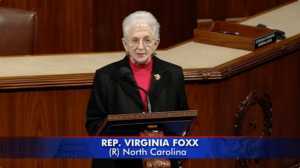
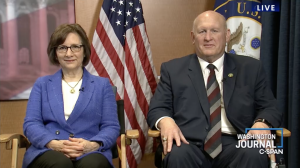

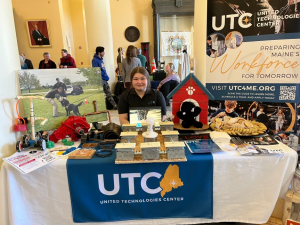 Maine kicked off Career and Technical Education (CTE) Month at the State House with a showcase featuring learners, instructors, and directors from 15 of the state’s 27 CTE centers. The showcase featured learners’ advanced skills in areas from biotechnology and hospitality to welding and graphic design. Notably, every instructor and director at the event reported an increase in “non-traditional students” participating in CTE programs.
Maine kicked off Career and Technical Education (CTE) Month at the State House with a showcase featuring learners, instructors, and directors from 15 of the state’s 27 CTE centers. The showcase featured learners’ advanced skills in areas from biotechnology and hospitality to welding and graphic design. Notably, every instructor and director at the event reported an increase in “non-traditional students” participating in CTE programs. 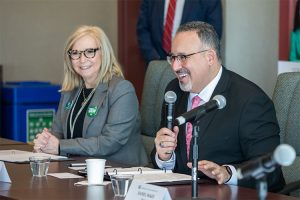 On February 21, U.S. Secretary of Education Miguel Cardona visited the Community College of Rhode Island (CCRI) as part of President Biden’s Investing in America Tour. The visit featured a tour of CCRI’s advanced manufacturing lab, a roundtable discussion with educational leaders, and dialogues with learners. Additional discussions took place with CCRI’s President Rosemary Costigan, Rhode Island Governor Dan McKee, and U.S. Representative Gabe Amo.
On February 21, U.S. Secretary of Education Miguel Cardona visited the Community College of Rhode Island (CCRI) as part of President Biden’s Investing in America Tour. The visit featured a tour of CCRI’s advanced manufacturing lab, a roundtable discussion with educational leaders, and dialogues with learners. Additional discussions took place with CCRI’s President Rosemary Costigan, Rhode Island Governor Dan McKee, and U.S. Representative Gabe Amo. 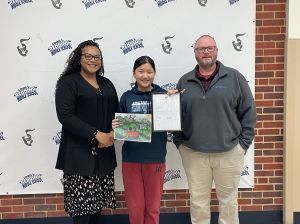 DACCTE Celebrates Poster Contest Winner
DACCTE Celebrates Poster Contest Winner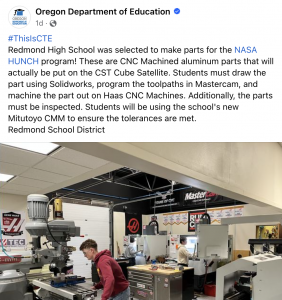
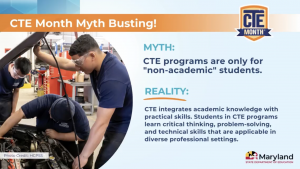
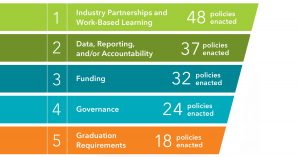

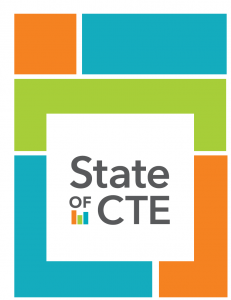 States make significant contributions to CTE programs through non-categorical, line item appropriations. Programmatic funding is distributed through periodic, legislatively established authorizations that are contingent on the availability of funds. States often place conditions on how money should be spent or used to promote state priorities. Additionally, a programmatic line item appropriation can be a recurring or a one-time investment. This blog highlights appropriations in industry-recognized credentials, Career Technical Student Organizations (CTSOs), career advisement, and educator preparation for fiscal year (FY) 2022. You can read more about categorical funding in the first blog in this series,
States make significant contributions to CTE programs through non-categorical, line item appropriations. Programmatic funding is distributed through periodic, legislatively established authorizations that are contingent on the availability of funds. States often place conditions on how money should be spent or used to promote state priorities. Additionally, a programmatic line item appropriation can be a recurring or a one-time investment. This blog highlights appropriations in industry-recognized credentials, Career Technical Student Organizations (CTSOs), career advisement, and educator preparation for fiscal year (FY) 2022. You can read more about categorical funding in the first blog in this series,  Additional Resources
Additional Resources

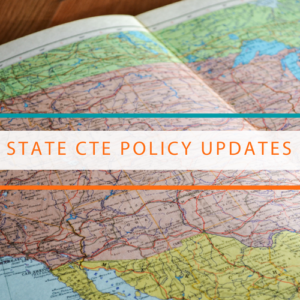 As explained in
As explained in 
 In October 2023, New Hampshire passed
In October 2023, New Hampshire passed  In March 2023, Virginia enacted
In March 2023, Virginia enacted 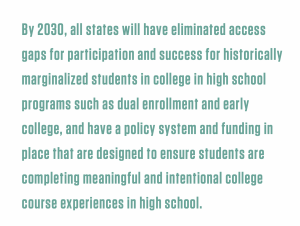
 Relevant Resources
Relevant Resources